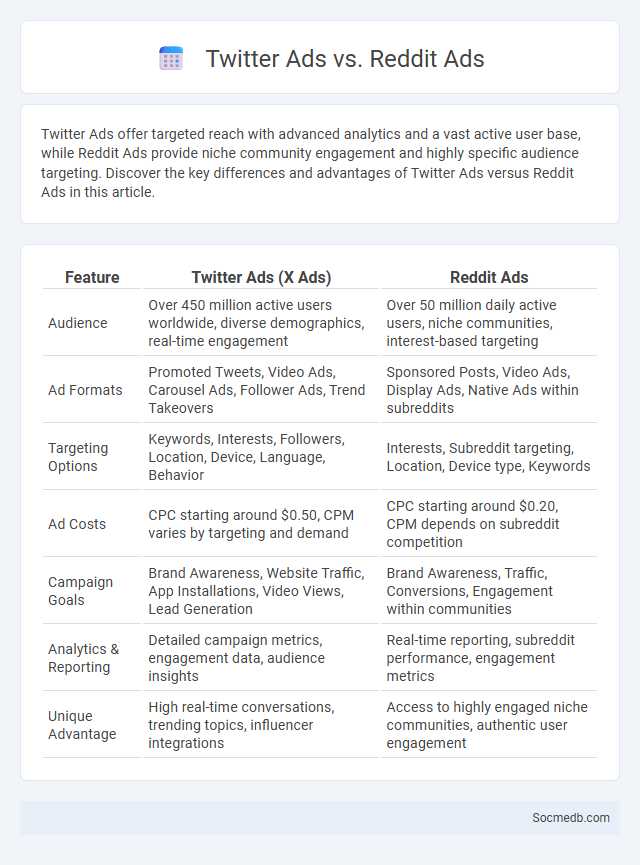
Photo illustration: Twitter Ads vs Reddit Ads
Twitter Ads offer targeted reach with advanced analytics and a vast active user base, while Reddit Ads provide niche community engagement and highly specific audience targeting. Discover the key differences and advantages of Twitter Ads versus Reddit Ads in this article.
Table of Comparison
| Feature | Twitter Ads (X Ads) | Reddit Ads |
|---|---|---|
| Audience | Over 450 million active users worldwide, diverse demographics, real-time engagement | Over 50 million daily active users, niche communities, interest-based targeting |
| Ad Formats | Promoted Tweets, Video Ads, Carousel Ads, Follower Ads, Trend Takeovers | Sponsored Posts, Video Ads, Display Ads, Native Ads within subreddits |
| Targeting Options | Keywords, Interests, Followers, Location, Device, Language, Behavior | Interests, Subreddit targeting, Location, Device type, Keywords |
| Ad Costs | CPC starting around $0.50, CPM varies by targeting and demand | CPC starting around $0.20, CPM depends on subreddit competition |
| Campaign Goals | Brand Awareness, Website Traffic, App Installations, Video Views, Lead Generation | Brand Awareness, Traffic, Conversions, Engagement within communities |
| Analytics & Reporting | Detailed campaign metrics, engagement data, audience insights | Real-time reporting, subreddit performance, engagement metrics |
| Unique Advantage | High real-time conversations, trending topics, influencer integrations | Access to highly engaged niche communities, authentic user engagement |
Overview: Twitter Ads vs Reddit Ads vs General Ad Campaigns
Twitter Ads offer precise audience targeting with real-time engagement and trending hashtag integration, making them ideal for brand awareness and quick interaction. Reddit Ads provide access to niche communities where you can engage deeply with highly specific interest groups, enhancing relevance and authenticity. Your choice between these platforms and general ad campaigns depends on targeting precision, engagement style, and campaign goals, with Reddit excelling in community-driven marketing and Twitter in viral reach.
Audience Targeting Capabilities Comparison
Social media platforms offer varied audience targeting capabilities, with Facebook leading in detailed demographic, interest, and behavior filters supported by its extensive user data. Instagram leverages Facebook's data for precise targeting, particularly excelling in visual-driven campaigns aimed at younger demographics. LinkedIn provides robust professional targeting options based on job title, industry, and company size, making it ideal for B2B marketing strategies.
Ad Formats: Twitter, Reddit, and Versatile Campaigns
Twitter offers diverse ad formats, including Promoted Tweets, Video Ads, and Carousel Ads, enabling brands to engage users with concise, interactive content. Reddit's ad formats, such as Promoted Posts and Sponsored AMAs, leverage highly targeted community-driven engagement for niche audiences. Versatile campaigns combining these platforms allow marketers to maximize reach and impact by tailoring messaging to Twitter's fast-paced environment and Reddit's in-depth discussions.
Cost and Budgeting Differences
Social media marketing budgets vary significantly based on platform choice, targeting precision, and campaign scope, with costs influenced by factors such as ad format, bidding models, and audience size. Facebook and Instagram typically offer cost-effective options for small businesses with flexible spending limits, while LinkedIn attracts higher budgets due to its professional targeting and CPC rates often exceeding $5. Accurate budgeting requires analyzing historical performance metrics and adjusting spend dynamically to maximize ROI across different social channels.
Engagement Rates and Performance Metrics
Monitoring social media engagement rates such as likes, comments, shares, and click-through rates provides critical insights into your content's resonance with the target audience. Performance metrics like reach, impressions, and conversion rates help optimize your campaigns by identifying what drives meaningful interactions and boosts brand visibility. By analyzing these data points, you can tailor your strategy to maximize user engagement and achieve measurable marketing goals.
Platform Demographics and User Behavior
Social media platforms exhibit distinct demographic trends, with Instagram attracting predominantly younger users aged 18-34, while Facebook maintains a broader age range including users over 50. User behavior varies across platforms, with TikTok emphasizing short-form video consumption and interaction, and LinkedIn focusing on professional networking and content sharing. Understanding these patterns is crucial for targeted marketing strategies and optimizing engagement on each social channel.
Creative Strategies for Each Platform
Creative strategies for social media vary significantly across platforms to maximize engagement and reach. On Instagram, leverage visually stunning imagery and Stories features to showcase your brand's personality and drive interaction, while on Twitter, concise, witty content paired with trending hashtags boosts visibility and real-time conversations. You can enhance your impact on LinkedIn by sharing industry insights and professional achievements, tailored to foster meaningful connections and establish thought leadership.
Analytics and Reporting Tools Offered
Social media platforms provide robust analytics and reporting tools that enable you to track engagement metrics, audience demographics, and content performance in real time. These tools offer detailed insights into reach, impressions, click-through rates, and conversion statistics, allowing data-driven decisions to optimize your social media strategy. Leveraging these analytics helps maximize ROI by identifying trends and adjusting campaigns for better audience targeting and increased interaction.
Best Use Cases: When to Use Each Platform
Instagram excels for visually-driven campaigns, making it ideal for fashion, travel, and food brands targeting younger audiences. LinkedIn is the best platform for B2B marketing, professional networking, and thought leadership content aimed at industry experts and decision-makers. Twitter suits real-time updates, customer service, and trending topic engagement, benefiting news outlets, event organizers, and tech companies.
Final Verdict: Choosing the Right Ad Platform for Your Goals
Selecting the right social media ad platform depends on your specific marketing objectives, target audience, and budget constraints. Facebook excels in detailed targeting and brand awareness, while LinkedIn is ideal for B2B lead generation, and Instagram offers powerful visual storytelling for younger demographics. Aligning your campaign goals with the platform's strengths ensures maximum return on investment and effective audience engagement.
 socmedb.com
socmedb.com